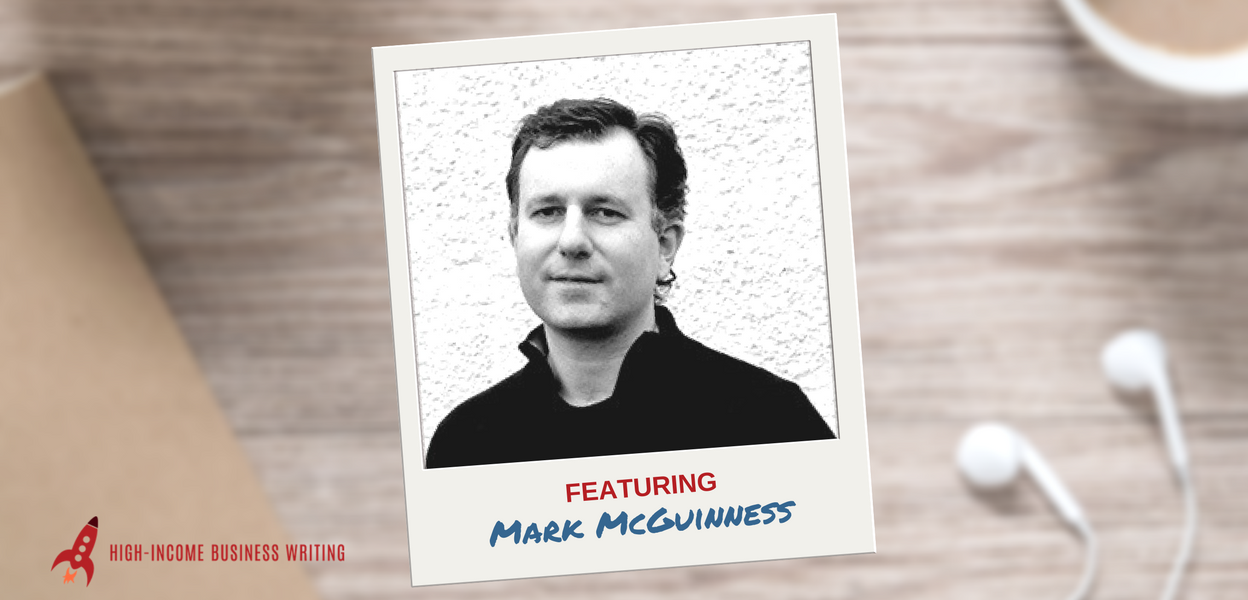If you struggle with productivity, this episode is for you.
First of all, you’re not alone. Productivity is a big challenge for creative professionals. Working from home means that you’re exposed to a ridiculous number of distractions. And when you’re in front of a computer all day long, the temptation to check email, social media or crazy cat videos can be paralyzing.
Yet if we’re ever going to do great work, we have to be productive. We know that intellectually. Making it work on a day-by-day and minute-by-minute basis, however, is challenging.
So as we kick off the New Year, I wanted to bring in my friend and colleague Mark McGuinness to the show.
Mark is a writer and coach who runs the website Lateral Action. He works with creative professionals to help them succeed (however you define success) by getting you to realize that “busy” does not equal “productive” or “innovative.”
Mark has a number of very practical and tactical tips for improving your productivity very quickly, and we’re going to cover those today.
But before we do that, I wanted to share an excerpt from a page on his website (www.LateralAction.com) where he explains what lateral action means to him, because it’s very relevant to our discussion today:
The most important skill for economic survival in the 21st century is creativity.
The creative economy is the final frontier. It’s the only area that can’t be automated or outsourced offshore.
At least not yet.
But creative thinking is not enough. You’ve got to actually try novel and unique things, and make those valuable mistakes that teach you way more than your successes.
It’s not enough to be productive if what you produce doesn’t make a difference. Those who stay busy with foolish productivity are scurrying around efficiently avoiding any real innovation, one productivity hack at a time.
Maybe it’s time to stop just getting things done.
And start focusing on doing things that really matter.
That’s how creative entrepreneurs operate.
That’s lateral action.
The notes that follow are a very basic, unedited summary of the show. There’s a lot more detail in the audio version. You can listen to the show using the audio player below. Or you can subscribe in iTunes to get this show delivered straight to the Podcasts app on your smart phone, tablet or iPod.


High-Income Business Writing with Ed Gandia
#118: Productivity for Creative People
Are we genuinely busier now? Or do we just have more distractions and choices?
We do have more choices. And more choices can mean more opportunities. But new opportunities can easily become distractions.
As creatives, we have to be able to focus and produce. One of our most important assets is sustained concentration.
Time is a constant. We can’t change it. But we can manage our ability to focus.
What are some of the myths of productivity?
We’ve all caught the busy-ness bug. We live in an “always on” culture.
But when you’re busy, your attention is fragmented.
Being busy isn’t the same as being productive.
If you’ve thought about your business, you know the two or three mission critical tasks you have to do every day. A lot of the rest is fluff!
As long as you do those two or three things mission critical things, your business will thrive.
Another myth is multi-tasking. Mentally, you can’t focus on two things at once. Instead, your attention shifts back and forth from one task to another.
If one of the tasks is relatively mindless (e.g. walking the dog), then multi-tasking can work. But if you’re trying to switch between two demanding mental tasks (e.g. checking email and writing a sales page), you use up a lot of your brain’s energy.
As a result, multi-tasking doesn’t facilitate productivity or creativity.
What do you think about the idea that some creatives need to wait for the muse to strike?
Try telling that to your client! When your job or business is riding on what you can produce, it’s amazing how much you can deliver!
But at the same time, you should allow your ideas to incubate.
Incubation happens after a period of intense work.
You get the brief, you do your research, you work on it. Then (when you’re walking the dog or having a shower), the idea incubates and you get inspired ideas.
In contrast, procrastination happens before you do the hard work. You’ll do almost anything but sit down and write.
When it comes to creative work, don’t confuse incubation with procrastination.
Sometimes the unconscious mind needs a bit of priming. So panic early. Don’t wait until the last minute to get started.
If you start your draft early, you’ll allow time for magic to happen.
What separates people who’re consistently productive from people who’re sporadically productive?
As you get older, it becomes harder and harder to be sporadically productive. Pulling all-nighters isn’t a viable long-term strategy.
People who are consistently productive look ahead in their schedules. They start early and panic early.
Being organized supports your creativity. We have this romantic idea that creatives thrive in improvisation and chaos. And some do.
That doesn’t work well when you have business responsibilities. The more organized you are, the more time you’ll have to be “in the zone.”
What about people who claim that being organized doesn’t fit with their personality or process?
You have to start by defining your ideal creative process. If you had nothing else to do but write, how would you spend your day?
Look at your energy rhythms. Most of us are more energetic in the morning and then later in the day. Schedule your writing for those high-energy periods.
Some people are more energetic in the afternoons, and that’s when they should write.
Save less creative work for low-energy times.
Tell us about the problem of resistance for freelancers
When you start as a freelancer, you have a rush of excitement. You think, “Wow, I have no boss. I can organize my day any way I want!”
But this opens the door to resistance. You think you have all day to write. So you decide to do it later. But emails pile up, your energy dips, and you end up scrambling at the end of the day.
If you decide how to structure your day as you go, resistance makes it harder for you to get stuff done. But if you decide in advance, “This is my writing time,” then you’ll panic if you miss that window of time.
What tools do you recommend to help us shut out distractions?
1. Freedom software allows you to block the Internet, social media and apps for a set period of time.
2. Disable the email on your phone. If you really need to access it, you’ll need to go through four screens to turn it back on. So you won’t be tempted to constantly check it.
3. Pause every time you get the urge to pick up your phone. Ask yourself, “Do I want the phone or do I want something on the phone?”
If you want something on the phone, that’s fine. But if you simply want the phone as a digital comfort blanket, then resist.
How do you use Post-it Notes?
Long lists of to-dos can be crushing. Mark uses Post-it Notes to create a list of things he needs to do today.
If anything else comes up during the day, it goes on tomorrow’s Post-it.
Tell us about your new book
Mark’s new book is Productivity for Creative People: How to Get Creative Work Done in an Always On World. It’s written for all kinds of creative types, from copywriters to novelists to designers to actors.
Find out where to purchase Mark’s book on his website.
Where can listeners learn more about you?
Mark McGuinness’ website: lateralaction.com






